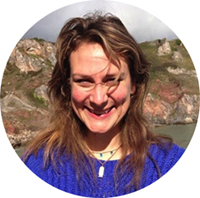I grew up in Staffordshire on a small farm, about 100 acres, which my parents still live on. My grandparents also lived there before them, so the farm and the countryside, the heart of England really, are very much part of my life. I go back to the farm often. It has been a real place of refuge and a place where I can recoup.I grew up in Staffordshire on a small farm, about 100 acres, which my parents still live on. My grandparents also lived there before them, so the farm and the countryside, the heart of England really, are very much part of my life. I go back to the farm often. It has been a real place of refuge and a place where I can recoup.
As a child, I was very, very accident prone. I remember distinctly getting thrown into a hedge by a bull. The horns of the bull went either side of me – I was very lucky – and I was tossed into a hedge of stinging nettles. My mother had to pick me up and drop me into a bath of Dettol. I remember it being very painful. My left thumb has marks on it from several stitches because I cut it off in some random way trying to saw some wood. Also, I was obsessed with tractors. I would sit in tractor cabs a lot and also used to fall asleep just watching the tractors go up and down the fields – it was very hypnotic to me.
We liked to explore wild places. Just beyond our farm was a ruined Norman castle, Chartley Castle, one of the last stopping points for Mary, Queen of Scots before her execution. As children, we played there, which would inform our imaginations. We’d play crusaders, and cowboys and Indians.
I love to visit Scotland, the Highlands, particularly the west coast. It’s truly our last wilderness in Britain, where there really is no one around for miles and you can feel totally away from everything. For me, that’s a really thrilling experience
One reason I like being out in the wilderness is because I find exercise very helpful mentally. It calms me down and it seems to ground me. When I go outside, I can stop my brain and I’m just thinking about the next step. I can take in a view of what I see and I find that a very meditative, very calming kind of feeling.
It annoys me that it’s very hard to make a living as a farmer. People who live in the countryside and work there are not thought about as much as those who live in the city. I think policies generally are very city-centric and urban-based. The government, on a local as well a national level, could help people to live in the countryside and not necessarily be so dependent on the land, to be able to diversify.
What appealed to me when I first read The Village was the idea of a television programme where the camera never leaves the village. We see the effects of what goes on in the wider world, but we see it on a very micro level and we witness how people interact and how they live their lives – different strata and different types of people.
My favourite animals to see in the wild are deer. My father used to take me up to Cannock Chase, where you climb up to the top of a tower and watch the deer. I have never gone stalking but I remember one day going walking on my own in the Highlands and coming over a hill and there was a stag just standing there, chewing. And it just looked at me – it didn’t run – and I stopped still and I was quite close. It was majestic, beautiful.
I think it would improve the countryside if people planted trees. I adore trees. We don’t plant enough trees. Trees are the lungs of our planet. Children love trees. I recall my father making us all plant trees, and I’ve always rather liked that.
My rural hero is Pip Evans. He’s my dad, and he has contributed to woodlands in Staffordshire, and always buys his Christmas tree from a Cannock Chase renewable woodland specialist!

